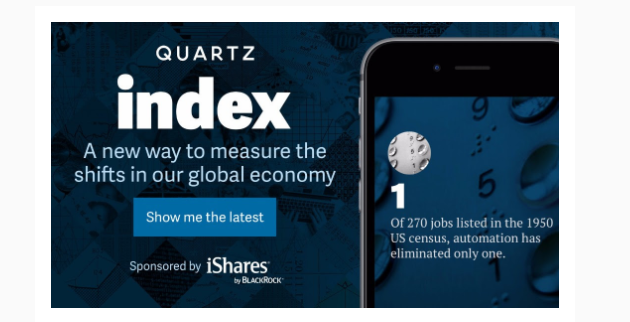This is the weekend edition of TheMarioBlog and will be updated as needed. The next blog post is Monday, April 10.
I encourage you to read the items below for a variety of information that you may find useful in the week ahead.
Creating new income streams
Six strategic lessons for publishers moving “beyond the article”
This piece offers global insights into emerging opportunities for new revenue streams and fresh storytelling formats.
Highlight
You can make money from mobile.
In Finland, a mobile app produced by Helsingin Sanomat, the largest newspaper in Finland has also created new income streams, enabling the publication to develop a “revenue model for the app… based on coupons, contests, and sponsored content rather than display ads.”
A spin off from Nyt, a youth-orientated offering, this model matters, because the “young audience is the most resistant to ads, being amongst the highest users of ad blockers.”
“Our audience is not waiting for tomorrow.”
Local Edition: What Mike Wilson learned at FiveThirtyEight and The Dallas Morning News
An editor who started in traditional print, then went to FiveThirtyEight in a totally digital newsroom, stops to meditate on his experiences.
Highlight question:
What skills do you think you learned from being at FiveThirtyEight that you’ve taken with you to Dallas?
I don’t know if it’s a skill, particularly, so much as an awareness that there’s an audience out there right now for our work that is not waiting until tomorrow or waiting until later today. The urgency of giving people information and then continuing a dialogue with them about whatever we’re publishing rather than having it just be a one-way thing. It’s mainly just that awareness of the urgency that was the biggest change in me.
And very good tip:
I think that writing continues to be a vital skill for people coming into the news.
Beyond that, our list includes:
– The ability to post and design items in our digital CMS.
– Use of social media, promoting your work, doing Facebook Lives, growing your followers.
– Analytics. Journalists here have access to the data about how things are going. We try to help them understand how to read that information, get a handle on what’s working for the audience and how it can influence story choice. If there’s an issue we’re writing about with the city that’s got a lot of readership, let’s come back with something more as soon as we can. If something consistently is not gaining audience and seems to us to be of little consequence to shoring up the democracy, let’s move on.
Read entire interview here: http://www.poynter.org/2017/local-edition-what-mike-wilson-learned-at-fivethirtyeight-and-the-dallas-morning-news/454536/ //
Quartz introduces new economic index

I like new product development and Quartz seems to be introducing new products quite frequently. The latest is a completely new version of Quartz Index that‘s designed “to really shine on your phone
Index highlights statistics that show how the global economy is changing. The first version, launched last year, took the form of a dashboard. The new version transforms each datapoint into its own story that you can easily read and share. For example, read about….
–the world’s longest flight;
–the one job destroyed by automation;
–why Brazil’s 0% GDP growth is actually good.
The stories in Quartz Index are built for mobile. You can tap or swipe through each story and, if you‘re enjoying yourself, keep tapping right through to the next one. Each story starts with a datapoint we’ve chosen to highlight and then places it in context through a series of cards.
And, like everything that Quartz does, there is a sponsor: The launch sponsor for this new version of Index is iShares by Blackrock.
Check it out here: https://qz.com/index/
Good news, bad news
First the bad news, which should not surprise anyone:
Did you know? From January 2001 to September 2016, newspaper publishers lost more than half of their employment, data from Bureau of Labor Statistics shows :
According to data released Monday by the U.S. Bureau of Labor Statistics, newspaper publishers lost more than half of their employment between January 2001 and September 2016, going from 412,000 jobs in January 2001 to 174,000 in September 2016. In contrast, Internet publishing jobs grew from 67,000 in January 2007 to 206,000 in September 2016. BLS’ data also shows some notable disparities between newspaper publishers and Internet publishers: In 2015, the average pay in Internet publishing was $197,549, while it was just $48,403 for newspaper publishers. And, between 2001 and 2016, the number of newspaper publishing establishments decreased by 18.1 percent, while the number of Internet publishing establishments increased by more than 150 percent from 2007 to 2016.
And the good news for The Guardian:
As the Financial Times hits 650,000 digital subscribers, it says its digital revenue has now overtaken print .
Fueled by Brexit and the U.S. election, the Financial Times has now reached a record 650,000 digital subscribers. And in its “annual results,” FT also says that its digital revenue is now more than its print revenue. While FT did not release profit or loss numbers, it did say that its digital subscribers grew 14 percent year-over-year in 2016, while print circulation fell by about 6 percent. And in the weeks around Brexit, FT says its new subscriber numbers were up by 75 percent, while they were up 33 percent around the U.S. presidential election.
TheMarioBlog post #2607